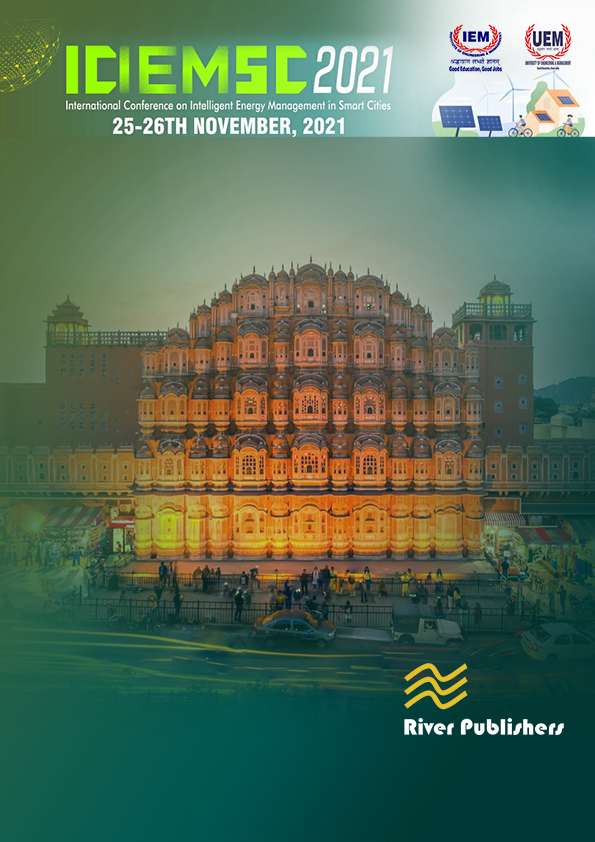
Emerging Intelligent Techniques for Energy Managements in Smart Cities
Proceedings of 1st International Conference on Intelligent Energy Management in Smart Cities (ICIEMSC-2021) https://iciemsc2021.uem.edu.in/
Emerging Intelligent Techniques for Energy Managements in Smart Cities
Proceedings of 1st International Conference on Intelligent Energy Management in Smart Cities (ICIEMSC-2021) https://iciemsc2021.uem.edu.in/
Editor: Bhanu Pratap Soni, Department of Electrical Engineering,
University of Engineering & Management, Jaipur
Fiji National University, Samabula Campus, Suva, Fiji
Ramani Kannan, Electrical & Electronic Engineering Department,
Centre for System Engineering, Institute of Autonomous System. UNIVERSITI TEKNOLOGI PETRONAS (UTP)
32610 Bandar Seri Iskandar, Perak Darul Ridzuan, Malaysia.
Sanjeevikumar Padmanaban, CTIF Global Capsule,
Department of Business Development and Technology, Aarhus University, Birk Centerpark 15, 7400 Herning, Denmark
Govind Rai Goyal, Department of Electrical & Electronics Engineering,
College of Engineering Roorkee, Roorkee, India
PIN- 247667
This book aims to provide intelligent energy management strategies recently developed for smart cities with their comparison to give readers an experimental view. It also provides the categorization of them into principle-based, data-driven, and composite methods. Future trends and existing challenges are also presented in the book, which generate fresh insight into energy management strategies. Recent advancements in artificial intelligence, electrical vehicles, green building, integration of renewable energy sources and demand response approaches have facilitated developing different strategies for an intelligent energy management system. The book also provides valuable information on design of micro-grids and integration of green energy sources with the power grid. Some of the topics include the development of demand side management techniques and their implementation for energy management in smart cities. This book also includes the recent techniques developed in management of distributed energy sources and storage systems. The contents of this book will be useful for researchers and practitioners working in different areas of smart grid technology.
Preface
by Bhanu Pratap Soni, Ramani Kannan, Sanjeevikumar Padmanaban
and Govind Rai Goyal
Article 1: Hybrid human powered vehicle: Research area of electric
bicycles.
by N.T.Kurhe, V.D.Wakchaure, Umesh Gurnani, and Anurag Hamilton
Article 2: Review and Design of Indirect Evaporative Cooling System
by Nitin S. Aher, Umesh Gurnani1, Anurag Hamilton and D.P. Bhaskar
Article 3: Implementation of Energy Efficient Burnishing Process for
Surface Integrity Improvement of Hole Finishing Tool
by Nitin J. Varpe, Ravindra S. Tajane, Umesh Gurnani and Anurag Hamilton
Article 4: A Review on HVAC Controller for High Energy
Efficiency Commercial Building
by Ganesh Murade, Anirudha Mukherjee,
Ganesh Shirsat, Ankit Kumar Sharma, Bhanu Pratap Soni
Article 5: Path to Urban Sustainability by use of IoT
by Ajay Kumar, Amit Kumar Bala
Article 6: Demand Side Energy Management in Deregulated
Environment: A Review
by Kshipra Pandey, Nilesh K. Patel
Article 7: Multi - agent system based Energy Management of Distributed
power sources in Domestic Cooking
by M. Lakshmi Swarupa, G.Divya, K. Deepika
Article 8: Efficiency Improvement by Thermo-Mechanical Coupling
by Tapan Sen, Sumit Paul
Article 9: Power Management Strategies in Hybrid AC/DC Microgrid:
A Review
by Anil N Navle, Naimish K Zaveri
Article 10: Review of Matrix Converter Application
by Shah Faisal, Bhanu Pratap Soni, Shah Aqueel Ahmed
Article 11: Ecological Footprint Assessment of Small Residential
RCC Building
by Yakub Ansari, Dilawar Husain, Jyotirmoy Haloi
Article 12: Network Reconfiguration using Fuzzy Logic for Power Flow
Balancing in IEEE 30 Bus System
by Fidah Hussian, Sam Joseph Paul, Govind Rai Goyal, Aadesh Kumar Arya
Article 13: Solution of Economic Load Dispatch Problem Using
Artificial Intelligence Based Advanced Algorithms
by Sam Joseph Paul, Fidah Hussian, Govind Rai Goyal, Bhanu Pratap Soni
Article 14: Renewable Based Hybrid Microgrid Scheduling
Incorporating Demand Side Management
by Arnab Ghosh, Saheli Sengupta, Niladri Chakraborty, Gargi Konar
Article 15: Batteries: Classification and Review of Electric Circuit Models for Electric Vehicle
by Arvind S. Pande, Bhanu Pratap Soni1, Kishor V Bhadane, Aniruddha Mukherjee
Article 16: Energy Efficient Heat Treatment Process to Remove the
Failure of Tool Steel in Industrial Component
by Kiran S. Phad, Anurag Hamilton, Umesh Gurnani
Article 17: Modern way of living: Smart City Management
by Sharwar Ahmed Chowdhury, Pratik Nag, Subhro Chakraborty
Article 18: A detailed study of Automation Techniques at Home that
contribute to Energy Efficiency
by Sougata Banerjee, Subhro Chakraborty
Article 19: Use of Autoclaved Aerated Concrete Blocks as Energy
Efficient Building Construction Materials
by Himanshu Yadav and V. Khan